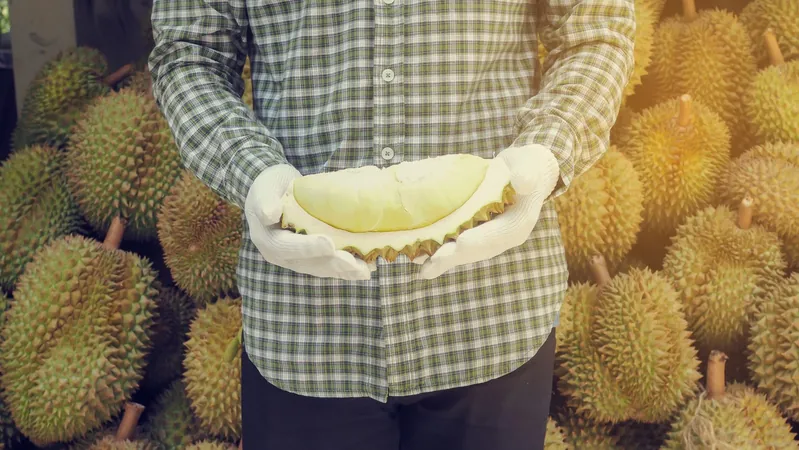
Beware the 'Tupai King': Singapore's Durian Lovers Under Siege by Fraudulent Vendors!
2024-10-09
Author: Arjun
SINGAPORE: Fraudulent Vendors Targeting Durian Enthusiasts
For avid durian enthusiasts, the delectable King of Fruits often comes at a price. However, unsuspecting buyers should be on high alert, as some unscrupulous vendors in Singapore are mislabeling durians to cash in on the demand for premium varieties.
Recent reports have surfaced indicating that some retailers are selling durian purportedly branded as “Tupai King.” Unfortunately, these signs may also display the esteemed name “Mao Shan Wang” beneath the Tupai King label, creating confusion for consumers who are carelessly drawn in by the tantalizing promise of premium durian at a premium price.
Understanding the Differences Between Durian Varieties
It's crucial to understand that not all durians are created equal. The Mao Shan Wang, affectionately known as Musang King, is revered for its rich, sweet flavor complemented by a slight bitterness, its creamy custard-like texture, and vibrant yellow flesh. This esteemed variety is easily identified by the distinctive five-point star shape on the fruit’s base.
On the other hand, Tupai King, a newcomer on the durian scene, launched merely three years ago, is characterized by a more pronounced bitterness and a unique top-opening feature. However, due to its rarity—only about 1,000 Tupai King durians are produced annually—the chances of encountering it in Singapore are slim. In stark contrast, during peak season, Singapore imports approximately 100 tons of durian daily from Malaysia.
Concerns Over Authenticity and Pricing
Reports suggest that the Tupai King may take years to become available in Singapore, raising questions about the authenticity of local vendors' claims. Furthermore, concern is growing regarding the origin of some durians marketed as Malaysian, with claims they might actually be sourced from Thailand or the Philippines, according to a recent article by Lianhe Zaobao.
Prices are reaching alarming heights, ranging between S$32 and S$68 per kilo for what is claimed to be superior Malaysian durian. It's worth noting that typically, durians from Thailand are priced lower than their Malaysian counterparts.
Be Aware During Off-Season Periods
As the Malaysian durian season, which runs from May to September, comes to a close and won’t resume until mid-November through February, consumers should exercise caution. Off-season periods may see buyers being misled by vendors eager to sell at inflated prices.
Should you find yourself craving durian during this period, approach with discernment and skepticism regarding labels claiming authenticity. You might just save yourself from regret if you mistakenly purchase a durian that fails to meet your expectations in flavor and experience.
Conclusion: Stay Savvy, Durian Lovers!
Stay savvy, durian lovers—it’s crucial to know what you're truly paying for in the world of fruits!

 Brasil (PT)
Brasil (PT)
 Canada (EN)
Canada (EN)
 Chile (ES)
Chile (ES)
 España (ES)
España (ES)
 France (FR)
France (FR)
 Hong Kong (EN)
Hong Kong (EN)
 Italia (IT)
Italia (IT)
 日本 (JA)
日本 (JA)
 Magyarország (HU)
Magyarország (HU)
 Norge (NO)
Norge (NO)
 Polska (PL)
Polska (PL)
 Schweiz (DE)
Schweiz (DE)
 Singapore (EN)
Singapore (EN)
 Sverige (SV)
Sverige (SV)
 Suomi (FI)
Suomi (FI)
 Türkiye (TR)
Türkiye (TR)